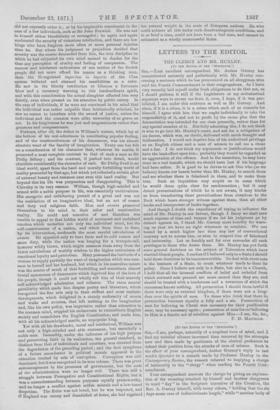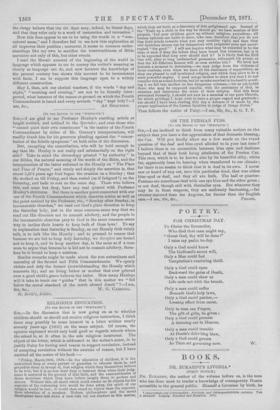[TO THE EDITOR OF THD " SPECTATOR:1 am, perhaps, naturally
of a sceptical turn of mind, and I find my unbelief oftener increased than removed by the attempts now and then made by gentlemen of the clerical profession to defend their position from the attacks of men of science. Such is the effect of your correspondent, Archer Gurney's reply in last week's Spectator to a remark made by Professor Huxley in the Contemporary Review, the remark referred to implying a charge of insincerity in the "clergy" when reading the Fourth Com- mandment.
Your correspondent answers the charge by giving an explana- tion of the meaning attached by himself and brother clergymen to word " day " in the Scripture narrative of the Creation, the Rev. A. Gurney himself, with many others, " holding that the six days mean eras of indiscriminate length," while " another body of
the clergy believe that the six days may, indeed, be literal days, and that they refer only to a work of restoration and recreation."
Now this does appear to me to be using the words in a " non- natural sense," and I therefore fail to see how this explanation at all improves their position ; moreover, it seems to common under- standings like my own to sacrifice the trustworthiness of Bible narrative not only of this, but other events.
I read the Mosaic account of the beginning of the world in language which appears to me to convey the writer's meaning as clearly as language can do, and now because the knowledge of the present century has shown this account to be inconsistent with facts, I am to suppose this language open to a widely different construction.
May I, then, ask our clerical teachers, if the words " day and night," "morning and evening," are not to be literally inter- preted, what becomes of the reason or ground on which the Fourth Commandment is based and every seventh " day " kept holy ?—I











































 Previous page
Previous page